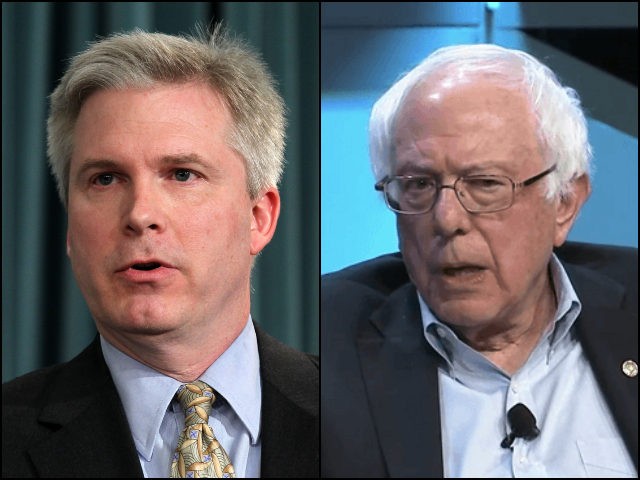“Medicare for All” study scholar Charles Blahous rebuked Sen. Bernie Sanders (I-VT) for misinterpreting his study in an op-ed on Wednesday, charging that charging that Medicare for All might cost $38 trillion, not save $2 trillion.
Mercatus Center scholar Charles Blahous released a new study on Monday that Sen. Sanders “Medicare for All” government-run healthcare scheme will cost $32 trillion over the next 10 years and would require “historic tax increases to pay for it.” Blahous noted that doubling individual and corporate income taxes would not cover the costs of the socialized medicine plan.
Sen. Sanders took to Twitter on Monday to claim that his socialized medicine plan would save $2 trillion over the next 10 years compared to America’s current government spending on health care. Sanders suggested that Medicare for All would help would help lower costs through lower administrative costs and less corporate greed; Blahous specifically countered the argument that Medicare for All would lead to overall lower costs thanks to lower administrative costs.
“Let me thank the Koch brothers, of all people, for sponsoring a study that shows that Medicare for All would save the American people $2 trillion over a 10-year period,” Sanders said.
However, Blahous fired back at Sanders in a Wall Street Journal op-ed on Wednesday, explaining that Medicare for All might cost much more than what his paper suggested.
Blahous generously assumed in his paper that Medicare for All would “immediately and dramatically” cut provider payment rates by roughly 40 percent during the first 10 years of the program. Without these generous expectations for decreased provider payment rates, Medicare for All would cost $38 trillion over the next 10 years.
Blahous explained:
Some have seized on a scenario in my estimates showing a slight decline in projected total public and private health expenditures under Medicare for All. But that decline, relative to current projections, relies on an assumption that Medicare for All would immediately and dramatically cut provider payment rates by roughly 40%. Without such cuts, Medicare for All would drive national health costs further upward, and the federal price tag would be $38 trillion during its first 10 years.
The entitlement scholar also suggested that under Medicare for All, the cost of increased single-payer insurance coverage would far outweigh the savings that come from lowered administrative costs and using generic drugs instead of name brand pharmaceuticals.
The scholar said:
Although Medicare for All proponents believe the administrative efficiencies of single-payer insurance would reduce national health-care costs, my research found the opposite—specifically, that the added costs associated with increased coverage far surpass not only the savings attainable from lower administrative costs, but also the savings potentially gained from swapping brand name drugs for generics.
“Before too many Americans become invested in the rhetorical vision of Medicare for All, there needs to be a serious national discussion about whether shouldering its vast cost is even remotely within the realm of practical possibility,” the health scholar added.

COMMENTS
Please let us know if you're having issues with commenting.